Do you worry about the quality of water in your home? The water you use for drinking, cooking, or bathing may not be as pure as you believe.
Many households do not realize that their tap water might have harmful contaminants such as chlorine, sediments, or even bacteria, which can pose health risks and harm appliances.
A whole house water filter provides a solution. By installing this system, you can have clean and safe water from every faucet in your home, which helps protect your family’s health and extends the lifespan of your appliances.
What Is a Whole House Water Filter?
A whole house water filter is a system that filters water at the point it enters your home. This means that every faucet, shower, and appliance receives filtered water.
The system is specifically designed to eliminate contaminants, resulting in cleaner, healthier, and better-tasting water. By using this system, you can ensure that the water used for drinking, cooking, cleaning, and bathing is safe for everyone in your family.
Benefits of Installing a Whole House Water Filter
There are several reasons why installing a whole house water filter is an excellent decision:
- Removes Harmful Contaminants: It eliminates harmful chemicals such as chlorine, heavy metals, sediments, and other impurities that may be present in tap water.
- Improves Water Taste: With cleaner water, you will notice a considerably better taste in both your drinking water and the food you prepare.
- Protects Appliances and Plumbing: Filters help minimize scale buildup in your plumbing and appliances, potentially extending their lifespan.
- Provides Safe Water for Everything: Whether you are washing dishes, taking a shower, or doing laundry, you can feel assured that the water is clean and safe.
Types of Whole House Water Filters
There are different types of whole house water filters available, each designed to remove specific contaminants:
- Sediment Filters: These filters effectively remove dirt, sand, and debris from your water supply. They are particularly beneficial for homes with hard water or those that obtain water from wells.
- Activated Carbon Filters: These filters are proficient in reducing chlorine, unpleasant odors, and chemical compounds that can alter the taste and smell of your water.
- UV Filters: A UV (ultraviolet) filter is highly effective in destroying bacteria, viruses, and other microorganisms that may be present in your water.
- Reverse Osmosis Systems: This type of filter eliminates a broad range of contaminants, including heavy metals, fluoride, and nitrates, making it one of the most thorough options available.
Key Features to Look for in a Whole Home Water Filter
When selecting a whole house water filter, there are several key factors to keep in mind:
- Filter Capacity and Lifespan: Check how long the filter will last and how much water it can treat before needing a replacement.
- Flow Rate: An effective filter should maintain adequate water pressure throughout your home, particularly if your household is larger.
- Certifications: Seek out filters that comply with NSF/ANSI standards, which guarantee their ability to effectively eliminate contaminants.
- Ease of Installation and Maintenance: Some filters are simpler to install and maintain than others. Be sure to select a system that aligns with your personal preferences and DIY capabilities.
How to Choose the Right Whole Home Water Filter?
Choosing the right filter for your home can feel overwhelming, but here’s how you can simplify the process:
- Assess Your Water Quality: Get a water test to determine what contaminants are present in your water. This will help you select the right type of filter.
- Understand Your Household’s Water Usage: Larger households may require a filter with a higher flow rate to ensure enough water is available for all uses.
- Consider Specific Contaminants: If your water test shows high levels of chlorine, you might need a carbon filter, while a UV filter might be needed to kill bacteria.
- Compare Costs: Think about both the upfront cost of the system and the ongoing costs of filter replacements and maintenance.
Installation and Maintenance Tips
After selecting your filter, the next step is to install and maintain it:
- DIY vs. Professional Installation: While some whole house filters can be installed by yourself, for more complicated systems, hiring a professional may be the best option.
- Replace Filters Regularly: Each filter type has its lifespan. Adhere to the manufacturer’s recommendations regarding when to replace filters to keep your system operating effectively.
- Maintaining Performance: Regularly inspect your system for any problems, and clean or replace filters as necessary to guarantee optimal performance.
Common Myths About Whole House Water Filters
Several myths exist regarding whole house water filters that deserve clarification:
- Myth 1: They Remove All Contaminants: Although they effectively eliminate many impurities, no filter can eliminate every contaminant. Therefore, it is critical to select a filter based on your requirements.
- Myth 2: They Reduce Water Pressure: Many individuals fear that a water filter will diminish water pressure, but this is generally not true with a quality system. Just ensure you pick one with an appropriate flow rate for your household.
- Myth 3: They Are Expensive to Maintain: While there are maintenance costs associated with water filters, many systems are budget-friendly, particularly when you consider the lasting advantages of cleaner water.
Conclusion
A whole house water filter is a wise investment that guarantees the water in your home is clean, safe, and devoid of harmful contaminants. Whether you are drinking, bathing, or using appliances, you will feel reassured knowing your water is healthier. By selecting the appropriate system for your home and maintaining it correctly, you can enjoy the advantages of pure water for many years ahead.










